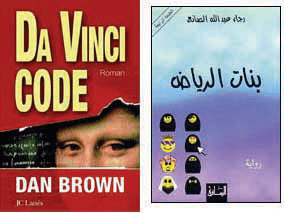
By Hussein Shobokshi for the Yemen Observer, June 27, 2006
Dan Brown’s novel The Da Vinci Code has been translated into 40 languages, including Arabic. The book has been adapted into a film showing all over the world, reaping millions of dollars. The story, as the majority of people know, questions the life of Jesus and claims that he married Maria Magdalene and fathered her child.
The suggestion has caused much controversy and has been strongly condemned by various Christian sects, which eventually led to the film being banned in Egypt and Lebanon (the book is sold in Egypt, but is censored in Lebanon). What was noticeable however was that the request for censorship in the Egyptian Parliament was made by Muslim MPs, who wanted to express their solidarity with the Copts and to defend Jesus.
This caught my attention and I could not help but draw comparison to the incident in Saudi Arabia concerning the novel Banat Al Riyadh (Girls of Riyadh). This book, which tells the story of four girls living in the Saudi capital, was met by a fierce campaign to stop it being published and sold to defend and protect religion and to oppose secularists. The author of the book, Dr. Rajaa Al Sanea, and Dr. Ghazi Al Gosaibi who wrote the forward for the book, faced numerous accusations and insults waged against the both of them. What was odd however was the complete silence from those who loudly protested against Girls of Riyadh when The Da Vinci Code came out, despite its severe insult of one of God’s prophets. Maybe they thought that there is no need to defend Jesus, as he is a prophet for the Christians who they may consider “disbelieversâ€.
The raging stance towards the book Girls of Riyadh confirmed once again that such a rejection was never based upon defending religion, but was rather a political and social position cloaked by religion to mobilize the public against the novel. Those who rejected Girls of Riyadh claimed that they sought to defend the dignity of women. The position that extremist movements call for through their ideologies is hypocritical, especially that they choose to ignore the offense that was waged against one of God’s prophets in comparison to their reaction to the Girls of Riyadh. Such a comparison underlines the dangerous manipulation of religion to play with people’s moods through a hazardous and misleading manner. As long as there are people to add fuel to the fire, extremism will continue.
[Hussein Shobokshi is a businessman and prominent columnist. Mr. Shobokshi hosts the weekly current affairs program Al Takreer on Al Arabiya, and in 1995, he was chosen as one of the “Global Leaders for Tomorrow†by the World Economic Forum. He received his B.A. in Political Science and Management from the University of Tulsa.]